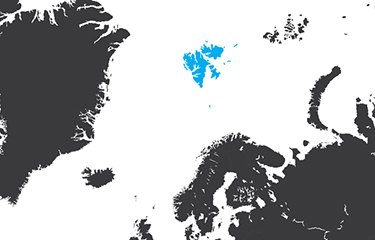Russia and Norway clash over status of waters around Spitsbergen/Svalbard

Russia and Norway have renewed an old controversy over the status of waters around the archipelago of Spitsbergen – or Svalbard as it’s officially called in Norway.
The countries have recently exchanged diplomatic blows in a dispute over whether Russian fishers are entitled to fish freely in the area, without the controls exercised by Norway’s authorities.
The controversy flared up early February after Russian Foreign Minister Sergey Lavrov brought the subject up to his Norwegian counterpart Ine Eriksen Soreide on the anniversary of the Spitsbergen/Svalbard Treaty. The crux of the controversy stems from the treaty, which was signed by 46 countries – including the U. S., the United Kingdom, Sweden, Denmark, France, Italy, and even Afghanistan and Venezuela.
In his message, Lavrov referred to provisions in the treaty which entitle participants to visit the archipelago and perform scientific and economic activities, including fishing.
The Russian Foreign Minister expressed concerns over the establishment of “Norway’s fisheries protection zone, the unreasonable extension of nature protection zones where economic operations are limited.”
The fisheries protection zone of 200 nautical miles has been enforced by Norway since 1977, with all the jurisdiction and controls exercised solely by Norway,. Those controls include on occasion arresting Russian fishing vessels and having shipowners fined for using prohibited gear or catching protected species.
The Russian Foreign Ministry made a proposal to conduct bilateral negotiations in order to eliminate barriers for Russian economic activity in the area and resolve some other problems relative to the archipelago.
Norway’s Ministry of Foreign Affairs also marked the 100th anniversary of the Svalbard Treaty, as the Spitsbergen Treaty is known in the country, issuing a statement marking the occasion and countering Russia’s criticism of the fisheries protection zone.
“Certain states have challenged Norway’s interpretation of the Treaty’s provision on equal rights to engage in fishing and hunting. Under the Treaty, ships and nationals from states that are parties to the Treaty have equal rights to engage in fishing and hunting on land in Svalbard and in the territorial waters around the archipelago, i.e. up to 12 nautical miles from land,” the ministry stated. “The right to equal treatment is not the same as the right to resources. The Norwegian authorities can both regulate and prohibit activities, as long as there is no discrimination on the basis of nationality. This is particularly important when we take action to safeguard Svalbard’s vulnerable environment or share limited resources.”
Norway’s Foreign Ministry sent an official answer to Lavrov’s proposal to conduct negotiations a few days later. It was voiced by the Russian Embassy in Oslo, which published on its official Facebook page that the proposal had been denied.
The position was further clarified by Audun Halvorsenin, state secretary of Norway’s Ministry of Foreign Affairs, in an interview with High North News.
“These are familiar Russian views that have been communicated on a regular basis and answered by the relevant Norwegian authorities. There is nothing new in Lavrov’s letter,” Halvorsenin said. “We respond to inquiries from Russian actors with an interest in Svalbard, be it Russian citizens or Russian companies. However, Norway does not consult other states about its exercising of sovereignty on any part of Norwegian territory.”
On 20 February, Russia’s Foreign Ministry spokesperson Maria Zakharova, during a regular briefing, expressed dissatisfaction and disappointment with Norway’s response.
“Spitsbergen has been brought under Norway’s sovereignty under certain conditions. Over recent years, Oslo has been violating the treaty’s provisions, which specificate the obligations of Norway. Such an approach is inadmissible for us,” she told media. She added that Russia is not going to dispute the sovereignty over the archipelago, but just “specific difficulties Russian companies are facing.”
“We cannot understand the permanent reluctance of Norway’s authorities to find solutions to these problems. This policy cannot bring positive things to our cooperation,” she said.
The spokesperson has not specified if any further actions will be made on the Russian Foreign Ministry’s part to pursue its request for negotiations.
Image courtesy of Paul Stringer/Shutterstock






Share